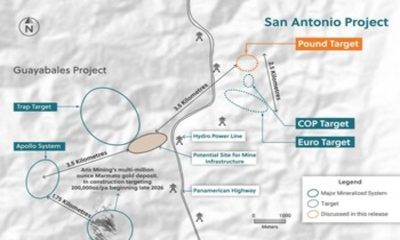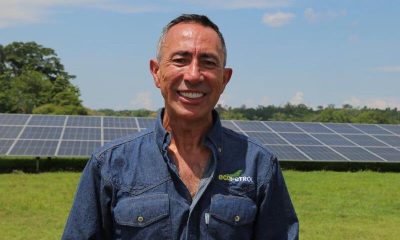Jimena Cortés Shares Why HTwenty Capital is Placing Venture Bets in Colombia Despite Unique Challenges
While there are now some notable Latin American “Unicorns,” the region has lagged behind others when it comes to developing a venture economy. Then still, within Latin America, Colombia has until recently punched below its weight in attracting venture dollars. This may be changing now, and some intrepid Venture Capital firms are betting on Colombian talent and the country’s technology infrastructure to produce results.
Htwenty Capital is one of those early stage venture firms. During a recent event organized by the City of Medellín’s investment promotion agency, ACI Medellín, Loren Moss, executive editor of Finance Colombia and Cognitive Business News was able to spend some time with the investment fund’s Platform Lead, Jimena Cortés to discuss the unique challenges—and opportunities that Colombia presents when it comes to funding and growing high potential startups.
Finance Colombia: I’m here with Jimena Cortés, who works with HTwenty Capital. What’s your role with HTwenty Capital?
Jimena Cortés: Sure, thank you very much for the invitation. I’m an investor for Spanish-speaking LATAM in HTwenty, and I also lead the platform efforts, that is, all the efforts we do post-investment for the portfolio.
Finance Colombia: Great, so HTwenty, my understanding is that it’s an early stage –it focuses on early stage seed, pre-seed, maybe Series A investments, really gets in early in the game. And then, you know, I did a little bit of homework, and you guys specialize in working closely, actively, with investors. Kind of holding their hand, serving a little bit more, you know, almost along the incubator route. Is that correct?
Jimena Cortés: Yes, in part, we’re an active fund, we’re super hands-on with our portfolio. A big, important part of our investment thesis is how we can generate value for our portfolio. That’s correct, we also enter in super early stages, it includes pre-seed also; pre-seed, seed, and pre-Series A is our sweet spot. And yeah, we have a really important network of advisors, super specialized in product, or on B2B acquisition, or technology. And we also have a playbook of partnerships and different stakeholders to help our portfolio, but we also strategically work along with them super closely.
Finance Colombia: Now, one interesting thing I noticed is that you guys have offices here in Colombia, in Mexico City, and Miami. You guys chose that geography as opposed to, let’s say, the traditional Silicon Valley or Boston or New York. Why?
Jimena Cortés: Yes, I think there are two answers to that question. The first one is that our thesis is a cross-border thesis, so we are super focused on creating this cross-border network, so companies from Colombia, Argentina, and Mexico can go to find operations in the US, but also from Colombia and Argentina to Mexico. So that’s an important part. And second, the ecosystem in Miami it’s growing in a really interesting way; it’s not the traditional Silicon Valley ecosystem, but we have a lot of second-time or third-time founders creating companies in Miami. So the ecosystem is getting pretty interesting, so we are making a bet on the Miami ecosystem.
“We invest in early stages. So basically, our sweet spot is pre-seed, seed, and pre-Series A.” – Jimena Cortés
Finance Colombia: Great. So speaking of here in Colombia, you’re Colombian, right?
Jimena Cortés: Yes, I’m Colombian.
Finance Colombia: So this has to be, you know, a point of personal pride that international venture capital firms are taking notice. What are the unique challenges compared to other Latin American locations like Mexico or Brazil? What are the unique challenges that Colombia faces when it comes to attracting venture capital?
Jimena Cortés: Yes, I think Colombia has done a pretty good job because we have a really good talent, technical talent, that is aiming to build interesting things. I think what’s more challenging is the exit ecosystem. Colombia has a small public or IPO system, so we have to look for other types of exits that are more in the private sector, and that’s how we attract these exits. Like in the US, there is a huge market on the M&A side. So I think the challenge here in Colombia is how we are going to exit to make the returns we expect, and how we also get into reasonable valuations.
Finance Colombia: Good point. I think that when we look at, for example, Colombian-listed companies, they tend to list –You know, I remember Tecnoglass, for example, a Colombian company. Now they’re based in Miami. They went from BVC in Bogotá to NASDAQ, then from NASDAQ to the New York Stock Exchange. When we look at the multilatinos, like here in Medellín, we have Grupo SURA, Bancolombia, Ecopetrol, and they’re all listed on the New York Stock Exchange. A lot of them also list in the BVC, maybe more for patriotism, I think, than anything else. So, because of that, it kind of precludes, to a large degree, going to a traditional domestic IPO because the capital markets or the demand for the securities aren’t there. Have you seen any companies, aside from obvious ones like, let’s say, Rappi, have you seen companies that have done international IPOs, that maybe it might be a company with Colombian roots, or other companies in your portfolio, Mexico, or elsewhere, that have gone the IPO route? Or is it more of, let’s look and get a strategic acquisition or private equity, or some other type of exit?
Jimena Cortés: Yeah. In this instance, we have not yet had any company that has made an IPO, either on their local market or in the US. We are looking more for private, targeted acquisitions strategically.
Finance Colombia: Now, looking at it from the entrepreneur standpoint, what type of venture, what type of founder, what type of entrepreneur should consider approaching HTwenty, and at what stage in their project?
Jimena Cortés : Sure. I think in early-stage VC, the founder and the founding team are the most important thing. So we focus on founding and building long-term relationships with these founders. We look for founders who are super technical, who have a lot of experience in the segment of the market they are approaching; we also value a lot the networking they can generate on the problem they are solving, and the obsession and passion for that particular problem, so they want to solve it. That passion that they feel about it.
We invest in early stages. So basically, our sweet spot is pre-seed, seed, and pre-Series A. We normally make tickets between 500,000 and 1.2 million. That’s our strategy. We look for equity ownership between 8% to 12% in these companies to build our long-term equity ownership for the ramp-up and the exits.
We have three main sectors we like to invest in. The first one is FinTech infrastructure. In LATAM, we have been focusing a lot on FinTech infrastructure because we see there’s a lot of gap in the technological infrastructure we have. For example, we invest in acquiring processing, in cross-border payments, in remittances, in collections, and public services. So we are going deeper into the infrastructure on the FinTech side. We think that through this infrastructure, with technology in this infrastructure, we can permeate the technological ecosystem in the region.
Second, we invest in verticalized SaaS, super focused on a particular value generation, like we have in restaurants, we have in inventory management, and other types of SaaS.
And AI. I think AI, of course, is a trending topic, but we are trying to understand how AI works as a backbone in the products and operations of our companies to make it more efficient and more productive. So with 30 people, you can do what you did three years ago, five years ago, you did with a hundred people.
Finance Colombia: Absolutely. And, you know, you’ve been generous with your time. It’s starting to get hot, the sun’s coming up here, I see that. I don’t want us to melt. But you know, I was looking at your website… You guys have some success stories that you’re pretty proud of that are still, of course, in the developmental stages. You mentioned the restaurant company that has restaurant SaaS software. Just mention maybe two or three of the companies that you guys have in your portfolio that are doing interesting things.
Jimena Cortés: Sure. For example, we have Felix Pago. That is a company that has recently closed its Series B with QED as a lead investor. So they have been doing really interesting things, growing at a really interesting pace. So we’re super excited about Felix Pago. We have also, from the Colombian side, Supra, which is working on cross-border payments and was the first investment made by Citibank New York here in LATAM. And we also have Akua, who is a founder from Medellín. They are building really interesting things in acquiring processing, and they closed the biggest pre-seed round in the region. So we’re excited about all the companies.
Finance Colombia: Congratulations. Much continued success, not just for you guys at HTwenty, but obviously for the Colombian entrepreneurial ecosystem. And what’s your website?
Jimena Cortés: Our website is www.htwenty.vc.
Finance Colombia: Thanks so much.
Jimena Cortés: Thank you.
























